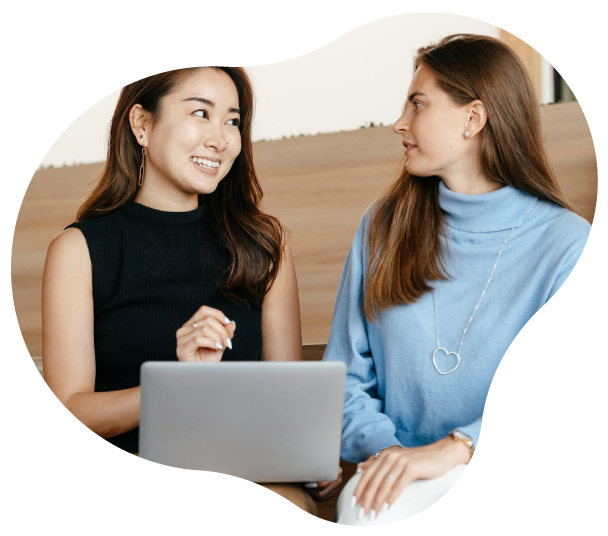Whether you are single or married, Fertility Awareness can help with all elements of a woman’s reproductive health.
Get in touch with a practitioner or teacher to discuss any questions you may have or to begin charting.


When I was 15, I had to go home sick from work for the first time. There was a pain throughout my body that no amount of painkiller or water would shake. As I left work, my concerned boss kept asking if I was okay or what might be wrong. I eventually admitted to him what I knew was causing me such pain: “Lady problems.”
Since I can remember, I’ve suffered from severe menstrual cramps. At about the age of 17 or 18 I sought help from my doctor who recommended the birth control pill. Any painkiller stronger than an over-the-counter medication, she told me, would need to be paired with another drug to protect the lining of my stomach. Desperate for relief and not knowing any other solution, I began taking the pill.
The pill helped ease the pain of my cramps and as far as I could tell, I wasn’t experiencing any negative side effects from it – I didn’t gain weight, didn’t break out or have any acne resolved, and my mood didn’t seem to change severely.
I was on the pill for three years before realizing how much time had passed. I wondered if, after so long, perhaps my body had changed and maybe my cramps would have subsided. I worried about the potential pain of having my cramps return, but I figured it was worth a shot and I could always go back on the pill if the pain was too much.
I decided to go off the pill. At first, my cramps were gone. I had a few pain-free cycles before the cramping slowly returned. At some point I came across a post from a friend on social media who was a naturopath. She shared a book on fertility awareness, a natural way to keep track of (or “chart”) one’s cycle as a way to achieve or avoid pregnancy or to treat cycle-related hormonal problems. Immediately I bought the book and started reading. As I read, it was both frustrating and intriguing to me - how was I not taught this in school? How were medical professionals not trained in this area? The frustration led to a desire to learn more, and with this new-found knowledge, I began to chart my cycle. I started to see patterns in my mood and my symptoms that aligned with where I was at in my cycle. It was exciting and empowering to learn so much about my body. It was wild to me that my body could tell me so much if I only knew how to recognize the signs.
A few months into charting I sought the support of a fertility awareness practitioner. As a young single woman, I’m not trying to achieve or avoid pregnancy right now, but my charting has revealed potential fertility problems that could affect me down the road. It’s helped identify suspected hormone imbalances that can be treated, sometimes simply through over the counter supplements and dietary adjustments. My practitioner is also able to refer me to a doctor who can work to diagnose the problems I’m having and prescribe me the medication I may need to treat them.
Women have been told their fertility is something to be suppressed, augmented, or controlled. In reality, our bodies tell a remarkable story about who we are and what we are capable of. I’m so grateful to have found fertility awareness and to have learned it now. While I’m most thankful for the way it’s taught me about my body, I can’t ignore the fact that learning fertility awareness as a single woman will be undoubtedly helpful when I’m married. It has created a foundation of knowledge that I can expand upon in the future.
Whether you are seeking answers to medical problems, are planning your family, or want to understand your health holistically, fertility awareness methods are an invaluable tool at your disposal.
Krista, North Vancouver
My Journey With Endometriosis
I was in school in the U.S. at the time. The pain had been something I had known my whole life, but it began to be so bad that I couldn't go to class. I couldn't even go to the bathroom because I experienced so much pain. I had this type of pain every month on my period since I was a teenager and was always told it was just part of it, but it had never been this bad. So, I made an appointment at the campus Health Centre. The doctor there suspected endometriosis. However, the gynecologist who did my exam brushed that aside and offered the pill or physiotherapy as my two options. I came so close to filling that prescription. Who wants to keep doing physiotherapy? However, I later decided against it and managed the pain.
After several days of having pain in my lower right abdomen that had progressed to the point that I couldn't sit comfortably, I knew something was wrong. I called 811, and the nurse told me a doctor should see me.
A CT scan revealed an ovarian cyst on my right ovary. I was recommended to wait three months to see if it shrank. Unfortunately, it did not shrink. Since the pain continued to affect my daily life, I opted for laparoscopic surgery to remove it and signed the papers in December 2019.
Spring 2020 arrived, and COVID cancelled all surgeries in March, leaving me unsure when I would get one. I kept praying and trusting God that things would be okay and work out, but it was challenging given all of the uncertainty of that time. Toward the end of April, I received a phone call. They had a surgery date for me. I cried out of surprise and relief. In May, I was extremely fortunate to have the surgery. The surgeon called me for my surgical follow-up and informed me they found a small amount of endometriosis on my uterus. Given my history, the diagnosis didn't come as a shock, but I wondered more and more about it as it began to settle in. "What if there was another endometriosis that needed to be removed?" "What if my ongoing bowel symptoms were related?" Feeling called to marriage, I began to worry about what would happen if I couldn't have children.
Around six weeks post-surgery, pain similar to the cyst came back. Minor at first, then it got to the point where it became difficult to sit at my desk at work or even drive when the pain was terrible. I scheduled a follow-up appointment with my surgeon and explained to her what was happening. I asked if it could be scar tissue from the surgery, but she didn't give me a straight answer. I also asked her about some of my other symptoms. She began to tell me that the only way to be sure if this was endometriosis was to take the birth control pill for a few months to see if my symptoms went away and how great it would be to suppress my cycle because I wouldn't have to deal with painful periods again. I was in tears after the call. Was my only option to take a medication I didn't want or continue to be in pain like this? My sister told me to listen to an Among the Lilies podcast episode called "Real Women's Healthcare." They discussed a process that sought to get to the root cause of the issues and not just mask the symptoms as the pill does.
After doing some more research, I learnt that you had to start by learning the Creighton Method of Charting and then be referred to a Napro specialist. I felt I could take charge of my health care in a way that suited my needs. Through Napro, I learnt that I have low progesterone. I pushed to see a gynecologist specializing in endometriosis excision. Even though I feared potentially having another surgery at the Women's Hospital, I began to feel less sorry for myself. I focused on what God was trying to teach me in physically painful moments. It helped that with Creighton, I felt like I was progressing towards better health.
During the summer of 2021, I had my appointment for a second laparoscopy because of my bowel symptoms. My surgeon wanted to do an MRI before the surgery. In September, the MRI showed possible endometriosis on my rectum and colon. It had to go to a panel of surgeons to discuss how to proceed with surgery (possible bowel resection). The thought of a bowel resection sounded terrifying, and I was worried about how this may affect the overall timeline for my treatment. A few days before my surgery in February 2022, they confirmed no bowel resection was needed. Still, they were bringing in a general surgeon just in case and would be removing my appendix. Recovery took longer than after my first surgery, but I am grateful that I trusted my instincts, asked questions, and pushed for a second opinion.
Following the surgery, I no longer get the same intense bowel symptoms I used to get every month on my period. I have learnt a lot in the last two years; there is always room to learn and grow. The way that it worked out was ultimately perfect timing. I had two surgeries when other surgeries were being cancelled. There have been so many small miracles throughout the past two years. In a way, understanding my cycle and learning more about my reproductive health have also helped to prepare me more for marriage. It hasn't been easy. It has been extremely stressful, upsetting, and worrisome, but it's taught me to be more open about the things I'm struggling with and to accept that I'm not perfect and don't have to appear that way and to stand up for myself.
Get in touch with a practitioner or teacher to discuss any questions you may have or to begin charting.


Find a practitioner or teacher:
marquettemethod.